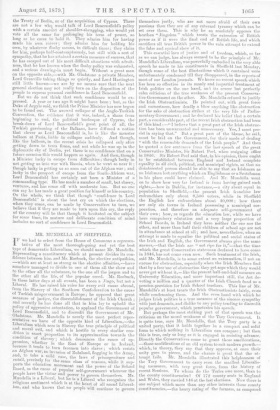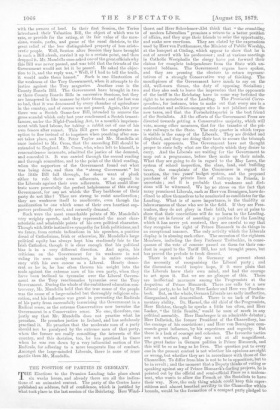MR. MUNDELLA AT SHEFFIELD.
IF we had to select from the House of Commons a represen- .11- tative of the most thorough-going and yet the beat type of democratic Liberalism, we should name Mr. Mundella. Representing a constituency which at present divides its con- fidence between him and Mr. Roebuck, the elective antipathies, —whiCh are at least as strong as the elective affinities,—have somehow managed to divide to one of them all the show and to the other all the substance, to the one all the jargon and to the other all the life, of the popular creed. Mr. Roebuck, in these latter days at all events, has been a Jingo, but not a Liberal. He has raised his voice for every evil cause abroad, from the Slavery of the Southern Confederation to the cause of Turkish misgovernment in Europe ; he opposed that great measure of justice, the disestablishment of the Irish Church ; and recently he has done all that in him lay to uphold the policy of aggressive ostentation, to applaud the Government of Lord Beaconsfield, and to discredit the Government of Mr. Gladstone. Mr. Mundella is nearly the most perfect repre- sentative we have of the opposite kind of Liberalism,—the Liberalism which sees in Slavery the true principle of political and moral evil, and which is hostile to every similar con- dition in exact proportion to its approximation towards the condition of slavery ; which denounces the cause of op- pression, whether in the East of Europe or in Ireland, because it tends to turn freemen into slaves ; which resists an Afghan war, an invasion of Zululand, flogging in the Army, and, to take a mild case, the laws of primogeniture and entail, precisely for the same class of reasons, while it sup- ports the education movement and the power of the School Board, as the cause of popular self-government wherever the people have the virtue and power to govern themselves. Mr. Mundella is a Liberal, but he is a Liberal who recognises the religious sentiment which is at the heart of all sound Liberal- ism, and who knows that no people will continue to govern
themselves justly, who are not more afraid of their own passions than they are of any external tyranny which can be set over them. This is why he so. resolutely opposes the heathen "Jingoism " which treats the extension of British power as if it were the final end of British life, and which sacrifices all true British power in the vain attempt to extend the false and cynical show of it.
This essential love of justice and of freedom, which, so far as we can judge, has always seemed to be the principle of Mr. Mundella's Liberalism, was powerfully embodied in the very able speech he made to his constituents in Sheffield last Monday, though some of the best illustrations which it contained were unfortunately condensed till they disappeared, in the reports of most of our London journals. We know no recent speech which has been so effective in its manly and impartial treatment of Irish politics on the one hand, and its severe but perfectly calm criticism of the true weakness of the present Conserva- tive Government on the other. Mr. Mundella refused to justify the Irish Obstructionists. He pointed out, with great force and earnestness, how deadly a blow anything like obstruction for the sake of obstruction strikes at the very life of Parlia- mentary Government ; and he declared his belief that a certain
part, a considerable part, of the recent Irish obstruction had been of this kind :•••-•44 I believe that a great part of the Irish obstruc-
tion has been unwarranted and unnecessary. Yee, I must per- sist in saying that." But a great part of the blame, he said, must be laid on the Government, for their mode of dealing "with the reasonable demands of the Irish people." And then he quoted a few sentences from the last speech of the great Conservative Minister, Sir Robert Peel, when resigning office in 1846. Sir Robert Peel said that, in his opinion, there ought to be established between England and Ireland complete equality in all civil, political, and municipal rights, so that no
disinterested person should be able to say that an Irishman as an Irishman lost anything which an Englishman or a Scotchman in his place could have claimed. And Mr. Mundella went on to show how very far Ireland is from having gained such rights,—how in Dublin, for instance,—a city about equal in population to Sheffield,—the present Irish franchise law enfranchises only about 8,500 voters, while in Sheffield the English law enfranchises about 40,000 ; how there are only six towns in Ireland possessing a municipal cor- poration, and therefore an adequate self-government of their own ; how, as regards the education law, while we have here compulsory education and a very large proportion of School Boards, in Ireland they have neither the one nor the other, and more than half their children of school age are not in attendance at school at all ; and how, nevertheless, when an attempt is made to equalise the political and social status of the Irish and English, the Government always give the same answer,—that the Irish are " not ripe for it,"—that the time which the great Conservative statesman declared to have come in 1846, has not come even now. Such treatment of the Irish, said Mr. Mundella, is to some extent an extenuation, if not an excuse for obstruction, especially when the Irish Members find that by a free'use of obstruction they get sops which they would never get without it,—like the present half-and-half measure on University Education, and more important still, the Act de- voting a million and a quarter of the Irish Church fund as a pension-provision for Irish School teachers. This line of Mr. Mundella's at least treats the Irish Obstructionists fairly, even while condemning them. And the even hand with which he judges Irish politics is a true measure of the sincere sympathy with just demands, and dislike to any policy tending to discredit popular government, which penetrates his speech. But perhaps the most striking part of that speech was the criticism on the moral weakness of the Tory Government. It is quite true, says Mr. Mundella, that the Tory party is a united party, that it holds together in a compact and solid form to which nothing in Liberalism can compare ; but then this is true, only so long as it is engaged in resisting advance. Directly the Conservatives come to grant those ameliorations, —those modifications of an old system to suit modern growth— which, in theory, they say that they approve, at once their unity goes to pieces, and the chance is great that the at- tempt fails. Mr. Mundella illustrated this helplessness of the Tory Government to carry even the smallest Liberalis- ing measures, with very great force, from the history of recent Sessions. To whom do the Tories owe more, than to the county constituencies ? Of 172 county seats in England and Wales, they carried 146 at the last elections. Now there is one subject which more than any other interests these county constituencies,—the heavy rating of the farmers, as compared with the owners of land. In their first Session, the Tories introduced their Valuation Bill, the object of which was to rate, or provide for the rating, at its fair value of the man- sions, woods, parks, and game of the rural districts, to the great relief of the less distinguished property of loss aristo- cratic people. Well, Session after Session they have brought in such a Bill afresh, carried it up to a certain point, and then dropped it. Mr. Munciella once asked one of the great officials why this Bill was never passed, and was told that the friends of the Government would not let it be passed. He asked the objec- tion to it, and the reply was, " Well, if I had to tell the truth, it would make them honest." Such is one illustration of the weakness of the Tory Government, when it attempts to do justice against the Tory magnates. Another case is the County Boards Bill. The Government have brought in two or three County Boards Bills in successive Sessions, but they are hampered in like manner by their friends ; and the last was so bad, that it was denounced by every chamber of agriculture in the country, and of course was not passed. Again, this year there was a Scotch Game-law Bill, intended to remove the gross scandal which only last year condemned a Scotch tenant- farmer, under the Night-Poaching Act, to a month's imprison- ment with hard labour, for taking a rabbit out of one of his own fences after sunset. This Bill gave the magistrates an option to fine instead of to imprison when poaching after sun- set takes place, and Mr. Peter Taylor and Mr. Mundella at once insisted to Mr. Cross, that the amending Bill should be extended to England. Mr. Cross, who, when left to himself, is reasonableness incarnate, admitted the justice of the demand, and conceded it. It was carried through the second reading and through committee, and to the point of the third reading, when the supporters of the Government found out what was being done, and then the " strong Government " let the little Bill fall through, for sheer want of pluck either to rule their own adherents, or to appeal to the Liberals against their own adherents. What could illus- trate more powerfully the perfect helplessness of this strong Government, for any act which the Tory backbone of their party do not like I They are strong to resist amelioration ; they are weakness itself to ameliorate, even though the amelioration be one which some of their own heartiest sup-• porters profoundly need, and earnestly demand. Such were the most remarkable points of Mr. Mundella's very weighty speech, and they represented the most char- acteristic and admirable points of his own political character. Though with little instinctive sympathy for Irish politicians, and we fancy, from certain indications in his speeches, a positive dread of Catholicism, Irish or otherwise, Mr. Mundella's large political equity has always kept him studiously fair to the Irish Catholics, though it is clear enough that his political
bias is in a very different direction. And again, his criticism on the Government for its weakness in not ruling its own unruly members, is in entire consist- ency with his own course as a Liberal. Hearty demo- crat as he is, he has often thrown his weight into the scale against the extreme men of his own party, when they have been inclined to tyrannise over the Liberal Govern- ment as the Tory reactionaries tyrannise over the Tory Government. During the whole of the embittered education con- troversy, Mr. Mundella held that the true cause of the people was the cause of a large-minded but thoroughly religious edu- cation, and his influence was great in preventing the Radicals of his party from successfully terrorising the Government in a Radical sense, as the extreme Conservatives now terrorise the Government in a Conservative sense. No one, therefore, can justly say that Mr. Mundella does not practise what he preaches. He preaches justice to Ireland, and has sedulously practised it. He preaches that the moderate men of a party should not be paralysed by the extreme men of that party, when the former are really consulting the interests of the country, and this doctrine, too, he has practised in times when he was run down by a very influential section of the Radicals, for adhering to a more temperate line of conduct. Amongst the large-minded Liberals, there is none of truer mettle than Mr. Mundella.































 Previous page
Previous page